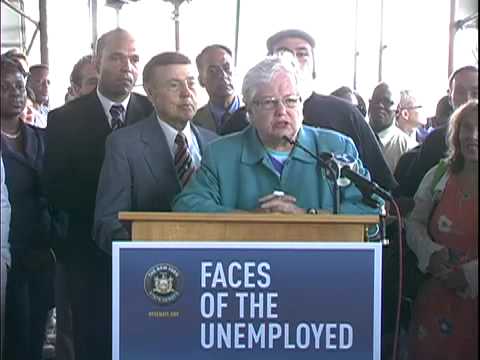Workers’ Compensation Board May Not Electronically Record Hearings Unless Legislature Changes Current Law Requiring the Use of Stenographers
George Onorato
October 11, 2009
-
ISSUE:
- Labor
-
COMMITTEE:
- Labor
State Senator George Onorato, the chairman of the Senate Labor
Committee, speaks out against plans by the New York State Workers’ Compensation Board to go forward with a pilot program that would replace stenographers with digital-audio recording at some workers’ compensation hearings.
NEWS FROM
STATE SENATOR GEORGE ONORATO
Chair, New York State Senate Labor Committee
_______________________________________________________________
For Release: October 8, 2009
Contact: Janet K. Kash (518)455-3486 kash@senate.state.ny.us
State Senator George Onorato, the chairman of the Senate Labor
Committee, speaks out against plans by the New York State Workers’ Compensation Board to go forward with a pilot program that would replace stenographers with digital-audio recording at some workers’ compensation hearings.
Workers’ Compensation Board May Not Electronically Record Hearings Unless Legislature Changes Current Law Requiring the Use of Stenographers
This week the Senate Labor Committee held a public hearing to review
plans by the Workers’ Compensation Board for a pilot program to use
digital-audio recording instead of stenographers to record and transcribe
workers’ compensation hearings. Current state law requires the use of
stenographers at workers’ compensation hearings. Previously, the
Legislature has rejected budget proposals to change this requirement, and
has not otherwise passed any legislation to allow the Board to record
hearings electronically or to use funding for such a pilot program.
Despite the Board’s lack of legal authority to electronically record
hearings, the Board’s Chairman and two witnesses for digital-audio
recording companies bidding for the pilot program indicated at the hearing that the pilot contract may be approved as early as this month. The Chairman also cited a purported lack of available court reporters for
hearings, and suggested there may be cost savings from reducing the Board’s current workforce of reporters. Neither the Chairman nor either of the bidders was able to provide Committee members with any information regarding the cost of their electronic recording programs, nor any savings to the Board from the use of electronic recording. Other witnesses responded to the alleged reporter shortage by noting that New York is transitioning to allow court reporters to be hired from sources other than civil service lists. They also pointed out that the state’s court reporter schools have high enrollment and graduation levels to meet the demand, which would also help New Yorkers in the current unemployment crisis.
The Committee heard from sixteen witnesses aside from the Chairman and the bidders, all of whom are opposed to the pilot program, including attorneys and representatives of injured workers, insurance carriers, employers, judges and court reporters. Many cited the malfunctioning of electronic recording in other jurisdictions that had experimented with it, but then determined that only court reporters are able to provide the accuracy needed to protect the rights of parties in litigation. An array of problems were identified, including mistrials due to missing recorded testimony, and the inability of the machines to accurately record concurrent speakers and dialects or to accurately transcribe inaudible testimony. When questioned by Committee members, a representative for one of the bidders, CourtSmart Digital Systems, denied any knowledge concerning the malfunctioning of CourtSmart’s recording equipment in Florida that resulted in the need for new hearings in murder, check theft, and drug trafficking cases, which was reported in the press. A representative for the other bidder, Jefferson Audio Video Systems, was unable to explain how its equipment could accurately transcribe testimony if the recorded words were unclear or inaudible.
Other problems identified at the hearing brought to light new
concerns that the ongoing case delay for injured workers at the Board may worsen with the use of electronic recording. Workers’ compensation judges would become responsible for operating the machines and managing case calendars, in addition to presiding over litigation and deciding cases. Both judges and attorneys would lose the benefit of real-time technology which enables court reporters to provide an immediate read back of testimony and transcripts overnight, if needed.
Many witnesses also complained that the Board was acting without
legal authority since the law requiring stenographers to record and
transcribe the minutes of workers’ compensation hearings and to certify to the accuracy of the transcripts - - workers’ compensation law section 122 -- has never been changed by the Legislature. Some expressed outrage that the Board was trying to bootstrap reforms from the Workers’ Compensation Reform Act of 2007 where the use of electronic recording instead of stenographers was never proposed as part of the carefully negotiated legislation between the Legislature, the Executive and affected groups.
Unless the Legislature determines the current law should be changed
to allow the Workers’ Compensation Board to experiment with the use of electronic recording, the Board may not proceed on its own. The hearing provided important information for the Committee and the Legislature to consider in any future deliberations to modify the required use of court reporters at workers’ compensation hearings. The Committee appreciates the comments and experience of all of the witnesses who took the time to testify at the hearing.
- 30 -
Janet K. Kash
Chief of Staff and Director of Communications
Office of State Senator George Onorato
Room 310 Legislative Office Building
Albany, NY 12247
Ph: 518-455-3486
Fax: 518-426-6929
Share this Article or Press Release
Newsroom
Go to Newsroom
Unemployment Insurance Reform
June 22, 2009
New York State Senator George Onorato, 12 SD
June 18, 2009
